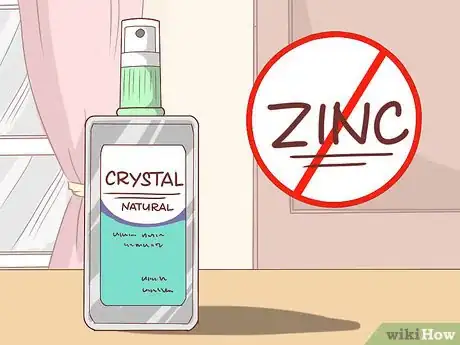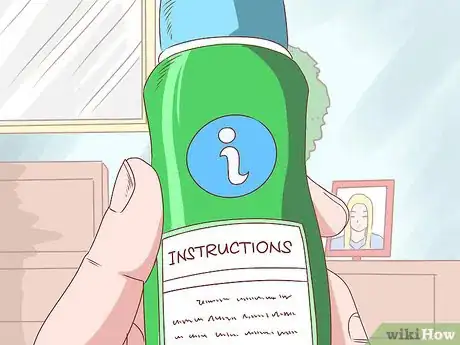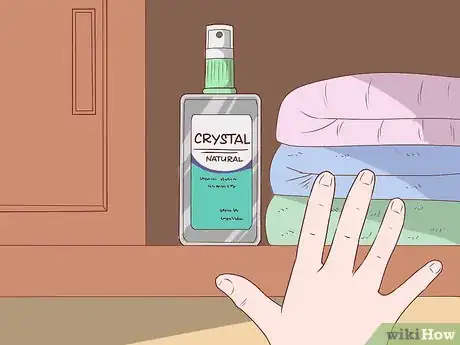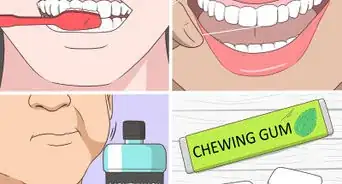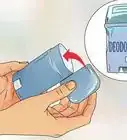This article was co-authored by wikiHow Staff. Our trained team of editors and researchers validate articles for accuracy and comprehensiveness. wikiHow's Content Management Team carefully monitors the work from our editorial staff to ensure that each article is backed by trusted research and meets our high quality standards.
This article has been viewed 53,113 times.
Learn more...
Applying spray deodorant seems like it should be a straightforward process. However, while all deodorants pose a risk of creating or aggravating allergic reactions, spray deodorants pose a double danger since they can be easily inhaled. Practicing safe habits and recognizing when you may be using more than needed will help minimize your lungs' exposure.
Steps
Applying the Deodorant
-
1Remove the appropriate pieces of clothing. If you are applying deodorant without taking a shower first, take off your shirt and anything you may be wearing underneath that. Remove your clothes so you don’t spray them along with your skin. Keep them clean so you can tell later on if you are using too much, if and when traces of deodorant appear on your clothes after contact with your skin.[1]
- Deodorant can also be applied to your feet to reduce their smell and the risk of blisters.[2] In this case, remove your socks instead!
-
2Dry your skin. Pat your skin with a towel. Remove all traces of moisture. Give your deodorant direct access to your pores without any blockage from sweat or water.[3]
- Definitely follow this rule if your deodorant doubles as an antiperspirant. The aluminum used in antiperspirants needs to enter your pores in order to prevent sweating.
- If you are using pure deodorant instead, experiment with dry versus wet skin. Some people believe that deodorant works best with wet skin.[4]
Advertisement -
3Spray your skin. First, give the canister a few shakes to stir up the active ingredients. Aim the nozzle at the target area.[5] Maintain a distance of at least six inches between the nozzle and your skin. Push the nozzle all the way down. Hold for one second, then release, to avoid creating an excessive cloud of spray. Wait until the mist disperses before applying more one-second bursts if needed. Recap the can when finished.
- You should only need about two to three seconds’ worth of total spraying.
- Hold your breath with your lips sealed while spraying to minimize the amount of mist that you breathe in.
- Do not hold the can upside-down. If it isn’t held upright, the can may fail to spray its contents, even though it isn’t empty.
-
4Rub the spray in, if needed. Make sure the deodorant is applied over the entire area. Rub the residue around so that all of your pores receive an equal amount. If you have a significant amount of hair growing there, use your fingers to work the deodorant through the hair so that it reaches your skin.[6]
- You can also spray your hands directly and apply the deodorant to other areas by rubbing it in. This method may be preferable to your armpits, so that you don’t have to aim the nozzle so close to your face.
Choosing the Right Products
-
1Consider your needs. Choose deodorant to reduce body odor. Use antiperspirant to reduce both body odor and sweating.[7] For pronounced problems, consult a doctor or athletic trainer for recommendations. Otherwise, consider the following:
- Does a deodorant's scent complement your own after application?
- Is a regular formula strong enough to last you all day, or would a longer-lasting or time-released formula be more beneficial?
- Is your skin prone to allergic or other severe reactions to common ingredients like aluminum?
- Is regular-strength deodorant sufficient to kill all of your odor-causing bacteria, or do you need an extra-strength formula?
-
2Try a natural spray. If you use antiperspirant as opposed to pure deodorant, be aware that most products contain some form of aluminum. Some debate exists over the possible link between this and cancer, plus other diseases.[8] If this is a concern, try a “natural” product that uses mineral salts in place of aluminum derivatives. Avoid those with a high amount of zinc, since this can irritate the skin.
-
3Experiment with different brands. Find more than one that works well for your body. Expect your body to build a natural immunity to a particular formula after repeated use. Change your brand or formula of deodorant every half-year or sooner if you notice more B.O.[9] To save money, start with sample or travel sizes, if available, to test each product's quality.
Using the Product Correctly
-
1Choose a well-ventilated area. Spray yourself outdoors or in a room that provides plenty of air circulation. Do not use in cramped bathrooms with small windows or no windows at all, especially if you have asthma. Allow plenty of air movement to dissipate the cloud of spray upon release so you don’t inhale it.[10]
-
2Follow the directions. Expect commercials to portray actors using deodorants in a manner that is in direct contrast to the instructions on the can. Do not regard advertisements as visual demonstrations of proper usage. Read and follow the instructions on the packaging for safe use.[11]
-
3Keep the product away from children. Store all chemical products out of reach from younger children as a general safe practice. But consider aerosol spray cans in particular as a tempting toy in the eyes of kids. Also, store cosmetic and hygienic products separately from other household items. Don’t confuse your children by spraying yourself with one aerosol product that came from the same cabinet where you keep, say, your foaming-bubble bathtub spray or WD40.
References
- ↑ http://www.huffingtonpost.com/entry/how-to-wear-deodorant_us_566a1b6ae4b080eddf57c06a
- ↑ http://stylecaster.com/beauty/deodorant-weird-facts/
- ↑ http://stylecaster.com/beauty/deodorant-weird-facts/
- ↑ http://stylecaster.com/beauty/deodorant-weird-facts/
- ↑ http://www.dove.com/us/en/men-care/deodorant/spray/men-care-clean-comfort-dry-spray-antiperspirant.html
- ↑ http://www.huffingtonpost.com/entry/how-to-wear-deodorant_us_566a1b6ae4b080eddf57c06a
- ↑ http://www.antiperspirantsinfo.com/en/antiperspirants-and-deodorants/about-antiperspirants-and-deodorants.aspx
- ↑ http://lifehacker.com/does-it-matter-what-kind-of-deodorant-i-buy-510096657
- ↑ http://stylecaster.com/beauty/deodorant-weird-facts/





